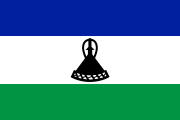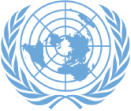
THE RIGHT HONOURABLE PAKALITHA BETHUEL MOSISILI
PRIME MINISTER OF THE KINGDOM OF LESOTHO
AND HEAD OF DELEGATION
TO THE MILLENNIUM SUMMIT OF THE UNITED NATIONS
7 SEPTEMBER 2000, NEW YORK
Distinguished Co-Presidents,
Excellencies,
Distinguished Ladies and Gentlemen,
I wish to congratulate the two Co-Presidents of the Millennium Summit,
President Tarja Halonen of Finland and President Sam Nujoma of Namibia upon their election to chair our meeting. They enjoy our full confidence and support.
I should also like to pay tribute to the Secretary-General of the United Nations,
Mr. Kofi Annan, for having come up with not only the idea of the Millennium Summit but also for having prepared a very incisive report for the Summit: "We the peoples: The Role of the United Nations in the 21st Century".
Distinguished Co-Presidents,
We are at an important juncture in human history, a time of reflection on "the role of the United Nations in the 21st century", the United Nations in which most of humankind places much faith and hope for a bright future. Can we say, with confidence, that such faith and hope are justifiably placed? Whatever answer we give to that question, I believe that it is within our capability to make it so. There is no doubt that when the United Nations Organisation was created in 1945, the expectations of all peoples of the world were high for an institution that promised an era of peace, security and the betterment of the living conditions of all peoples.
Given the pall of despair that had descended upon the world following a prolonged and brutal war, the human spirit could not but be uplifted by the lofty words and intentions of the Charter of the United Nations: to save succeeding generations from the scourge of war; to reaffirm faith in fundamental human rights, in the dignity and worth of the human person, in the equal rights of men and women and of nations large and small; and to promote social progress and better standards of life in larger freedom.
Unfortunately, it was not until 50 years later in 1994, that institutionalized colour discrimination was defeated in South Africa. In a similar vein, the poor countries of the South, including my own, are yet to see genuine economic emancipation, despite the creation of the International Bank for Reconstruction and the International Monetary Fund, which are meant to give practical meaning to the lofty aspirations of the U. N. Charter.
The attainment of democracy in sub-Saharan Africa must be accompanied by corresponding economic gains and reduction of poverty. Yet for the majority of us who have embraced democracy are yet to reap the fruits of this change. We have waited too long; and change must come now. We are unable to meet the challenges of globalization and to take advantage of the opportunities it offers for development and the relief of poverty. We are similarly unable to take full advantage of the opportunities presented by advances in information and communication technology which hold great prospects for our rapid development. The defining challenge of the 21st century is how to close the present gap in development between the developed and the developing nations.
The renaissance that the Economic and Social Council has been experiencing in the last three years is very gratifying and must be sustained. The defining question of the 21st century will be how to close the present gap in development between the developed and the developing countries. The role of ECOSOC in translating our aspirations into reality should be further strengthened. It will be necessary, therefore, in the 21st century to rethink the powers of ECOSOC so that it is put on a footing commensurate with its importance.
Distinguished Co-Presidents, on the eve of the 21st century we must continue to dream of a future filled with hope for humanity. A policy framework that is regaining currency is the one of a New Global Human Order whose essential elements are:
- The creation of a new partnership between the developing and the developed countries based on full cooperation for their mutual benefit
- The promotion of a democratic culture and good governance
- The adoption of a development strategy that is centered on people as objects of development, and one that is sensitive to issues of equity, gender equality, the rights of indigenous people, and the protection of the environment
- Increased productivity and production with equity through the application of science and technology
- The elimination of the debt burden for developing countries
- The reduction of extreme poverty
- The creation of a global development facility funded by such new and innovative sources of financing such as cuts in military spending, levies on pollution and a tax on speculative capital.
This concept deserves our serious consideration in the 21st century as a new basis for a reinvigorated international co-operation and partnership in the battle against poverty. It is our hope that the United Nations will have the fortitude to make the right choices and thus serve humanity better.
Finally, we would like to join all distinguished delegations in calling for a United Nations that is strengthened to wage the war against HIV/AIDS.
I thank you.


